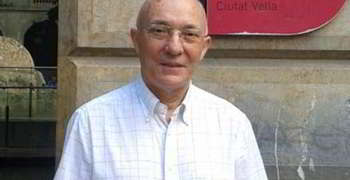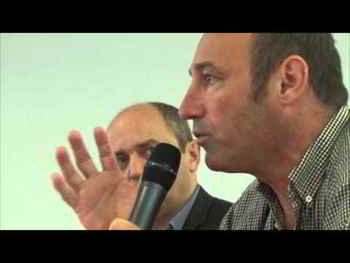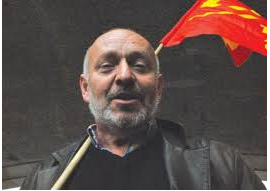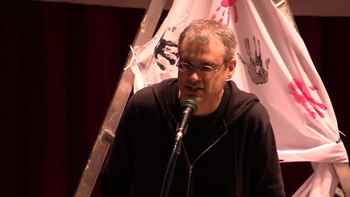Macerata, ordinaria follia oppure normalissimo fascismo?
Ovvero come si fa a distinguere un pazzo da un razzista savio?
di Checchino Antonini
 Macerata, ordinaria follia o ordinario fascismo? Mettiamo in fila i fatti: un fascio-leghista gira per ore per Macerata sparando sui migranti. Ne ferisce sei. Quando lo prendono si fa portar via avvolto in un tricolore, ostentando il saluto romano. Nel 2017, Luca Traini, è stato candidato della Lega Nord alle amministrative. Il Comune, dai social network, invita a rimanere chiusi in casa, nei luoghi di lavoro e nelle scuole, i mezzi pubblici fermati fino a nuovo ordine. Salvini – coda di paglia – prova a smarcarsi puntando l’indice su chi avrebbe riempito l’Italia di clandestini. Forza nuova si offre di pagare le spese legali al razzista avvolto nella bandiera italiana. Solo pochi giorni prima, a Mestre, un ventenne ha tentato di rapinare una tabaccheria. Lo hanno preso poco dopo con alcuni grammi di eroina in macchina, la pistola e tutto il kit del piccolo rapinatore. Sul suo profilo fb, post inneggianti a Forza nuova, contro i “negri” e foto a fianco al ducetto di quel partito. Chissà se anche a lui verranno offerte le spese legali. Un salto indietro di poche settimane e di 5-600 chilometri. Roma: arrestato un trentottenne che, insieme a gentiluomini di Forza Nuova e CasaPound, guidava la protesta al centro di accoglienza di via del Frantoio, al Tiburtino III. Ma il tipo è stato “bevuto” per una rapina ai danni di una gelateria. Di giorno italiani indignati, di sera rapinatori. E non è una mosca bianca, anzi nera. È stata arrestata per furto anche la donna che a fine agosto aveva raccontato di essere stata sequestrata da alcuni migranti tra i cancelli del presidio umanitario di via del Frantoio, innescando l’assedio dei fascisti al centro per minori stranieri. Nell’estate precedente, a Fermo, un ultrà di destra della locale compagine, aveva ammazzato a pugni un richiedente asilo. Anche lui amava farsi fotografare con magliette di Fn e Cpi. Nel 2008, cinque ragazzotti legati in qualche modo a Forza nuova Verona hanno ucciso per futili motivi Nicola Tomassoli, un giovane di sinistra. Forse la sua colpa fu quella di avere il codino o forse rispose con fare seccato alla richiesta di una sigaretta ma certamente il suo omicidio maturò nell’humus fascio-alcolico che spesso la sera trabocca nelle strade e nelle piazze della “città dell’amore”. E Renato Biagetti morì di lame fasciste nell’estate 2006, all’uscita da una festa in spiaggia, solo perché era una “zecca”. E prima di lui, Dax, un operaio di Milano fu aggredito a marzo del 2003, da padre e due figli fascisti che portavano a pisciare il loro cane Rommel. Dax morì in ospedale. Come si fa a distinguere un fascista da un folle? Chi mette le bombe sui treni o nelle piazze, chi pensa che esistano complotti ebraici contro i bianchi cristiani, chi pensa che le razze esistano e alcune siano superiori mentre altre inferiori, chi pensa che la guerra sia desiderabile, chi ritiene legittimo che un essere umano possa sfruttarne un altro, che lo possa violentare o uccidere, ebbene è un pazzo o, banalmente, solamente un fascista?
Macerata, ordinaria follia o ordinario fascismo? Mettiamo in fila i fatti: un fascio-leghista gira per ore per Macerata sparando sui migranti. Ne ferisce sei. Quando lo prendono si fa portar via avvolto in un tricolore, ostentando il saluto romano. Nel 2017, Luca Traini, è stato candidato della Lega Nord alle amministrative. Il Comune, dai social network, invita a rimanere chiusi in casa, nei luoghi di lavoro e nelle scuole, i mezzi pubblici fermati fino a nuovo ordine. Salvini – coda di paglia – prova a smarcarsi puntando l’indice su chi avrebbe riempito l’Italia di clandestini. Forza nuova si offre di pagare le spese legali al razzista avvolto nella bandiera italiana. Solo pochi giorni prima, a Mestre, un ventenne ha tentato di rapinare una tabaccheria. Lo hanno preso poco dopo con alcuni grammi di eroina in macchina, la pistola e tutto il kit del piccolo rapinatore. Sul suo profilo fb, post inneggianti a Forza nuova, contro i “negri” e foto a fianco al ducetto di quel partito. Chissà se anche a lui verranno offerte le spese legali. Un salto indietro di poche settimane e di 5-600 chilometri. Roma: arrestato un trentottenne che, insieme a gentiluomini di Forza Nuova e CasaPound, guidava la protesta al centro di accoglienza di via del Frantoio, al Tiburtino III. Ma il tipo è stato “bevuto” per una rapina ai danni di una gelateria. Di giorno italiani indignati, di sera rapinatori. E non è una mosca bianca, anzi nera. È stata arrestata per furto anche la donna che a fine agosto aveva raccontato di essere stata sequestrata da alcuni migranti tra i cancelli del presidio umanitario di via del Frantoio, innescando l’assedio dei fascisti al centro per minori stranieri. Nell’estate precedente, a Fermo, un ultrà di destra della locale compagine, aveva ammazzato a pugni un richiedente asilo. Anche lui amava farsi fotografare con magliette di Fn e Cpi. Nel 2008, cinque ragazzotti legati in qualche modo a Forza nuova Verona hanno ucciso per futili motivi Nicola Tomassoli, un giovane di sinistra. Forse la sua colpa fu quella di avere il codino o forse rispose con fare seccato alla richiesta di una sigaretta ma certamente il suo omicidio maturò nell’humus fascio-alcolico che spesso la sera trabocca nelle strade e nelle piazze della “città dell’amore”. E Renato Biagetti morì di lame fasciste nell’estate 2006, all’uscita da una festa in spiaggia, solo perché era una “zecca”. E prima di lui, Dax, un operaio di Milano fu aggredito a marzo del 2003, da padre e due figli fascisti che portavano a pisciare il loro cane Rommel. Dax morì in ospedale. Come si fa a distinguere un fascista da un folle? Chi mette le bombe sui treni o nelle piazze, chi pensa che esistano complotti ebraici contro i bianchi cristiani, chi pensa che le razze esistano e alcune siano superiori mentre altre inferiori, chi pensa che la guerra sia desiderabile, chi ritiene legittimo che un essere umano possa sfruttarne un altro, che lo possa violentare o uccidere, ebbene è un pazzo o, banalmente, solamente un fascista?


 El martes día 30 por la mañana Roger Torrent, presidente del Parlament y miembro de ERC, aplazó el pleno que debía investir Puigdemont sin advertir antes a JuntsxCatalunya y la CUP, que mostraron abiertamente su desacuerdo. Pero no se suspendieron las manifestaciones y concentraciones que habían organizado la ANC (pero no Omnium) y los CDR, en las que uno de los gritos más populares fue "Carles Puigdemont, el nostre president". La ANC disolvió su concentración después del parlamento de su vicepresidente, pero los CDR la continuaron y más tarde un numeroso grupo de personas logró entrar en el parque de la Ciutadella e ir hasta la entrada del Parlament donde se mantuvieron hasta la madrugada. Por la noche Puigdemont difundió un vídeo en el que insistía en que "no hay ningún otro candidato posible". Las tensiones dentro del independentismo son hoy, miércoles día 31, el gran tema de los medios de comunicación y las redes sociales.
El martes día 30 por la mañana Roger Torrent, presidente del Parlament y miembro de ERC, aplazó el pleno que debía investir Puigdemont sin advertir antes a JuntsxCatalunya y la CUP, que mostraron abiertamente su desacuerdo. Pero no se suspendieron las manifestaciones y concentraciones que habían organizado la ANC (pero no Omnium) y los CDR, en las que uno de los gritos más populares fue "Carles Puigdemont, el nostre president". La ANC disolvió su concentración después del parlamento de su vicepresidente, pero los CDR la continuaron y más tarde un numeroso grupo de personas logró entrar en el parque de la Ciutadella e ir hasta la entrada del Parlament donde se mantuvieron hasta la madrugada. Por la noche Puigdemont difundió un vídeo en el que insistía en que "no hay ningún otro candidato posible". Las tensiones dentro del independentismo son hoy, miércoles día 31, el gran tema de los medios de comunicación y las redes sociales. Quoi qu’on pense de l’indépendance de la Catalogne, le processus catalan est quelque chose de passionnant à étudier pour les militants progressistes, démocrates et en rupture avec ce système capitaliste qui nous fait foncer vers le précipice.
Quoi qu’on pense de l’indépendance de la Catalogne, le processus catalan est quelque chose de passionnant à étudier pour les militants progressistes, démocrates et en rupture avec ce système capitaliste qui nous fait foncer vers le précipice. L’activité financière basée sur le recouvrement de
L’activité financière basée sur le recouvrement de  ATHENS, GREECE – For years, throughout the severe economic crisis that has plagued Greece over much of the past decade, the international media and financial press have held Greece up as a striking example of financial folly and mismanagement. Greece’s debt, we have been told, is the product of fiscal irresponsibility, of “lazy” and “unproductive” Greeks living beyond their means and spending recklessly. Moreover, Greece has been chastised for not emerging out of its economic doldrums despite being the recipient of hundreds of billions of euros worth of “free bailout money.” In short, Greece has been presented as an example for other countries to avoid at all costs.
ATHENS, GREECE – For years, throughout the severe economic crisis that has plagued Greece over much of the past decade, the international media and financial press have held Greece up as a striking example of financial folly and mismanagement. Greece’s debt, we have been told, is the product of fiscal irresponsibility, of “lazy” and “unproductive” Greeks living beyond their means and spending recklessly. Moreover, Greece has been chastised for not emerging out of its economic doldrums despite being the recipient of hundreds of billions of euros worth of “free bailout money.” In short, Greece has been presented as an example for other countries to avoid at all costs.
 Soviet planning suffered from a slowing up of growth, the damage of bureaucratism both on the quality of the products and their cost, internal pressures (popular and coming from the apparatus) in favour of the consumption of Western products, and of the need to improve the possibilities of exports to countries with strong currencies to buy their products. It was under these pressures that the debate on reforming planning took place: it was initiated in the first half of the 1960s from inside an apparatus which, in the USSR, had put an end to the ‘chaos’ of Khrushchev’s thaw and had assumed Soviet intervention against the Hungarian workers’ councils. That is to say, that in a dominant fashion, the reformist economists discussing ‘economic laws’ and productivity, avoided any issues of democratisation and workers’ self-management – except in Yugoslavia and inside the Czech CP, the self-management wing linked to Jaroslav Sabata.
Soviet planning suffered from a slowing up of growth, the damage of bureaucratism both on the quality of the products and their cost, internal pressures (popular and coming from the apparatus) in favour of the consumption of Western products, and of the need to improve the possibilities of exports to countries with strong currencies to buy their products. It was under these pressures that the debate on reforming planning took place: it was initiated in the first half of the 1960s from inside an apparatus which, in the USSR, had put an end to the ‘chaos’ of Khrushchev’s thaw and had assumed Soviet intervention against the Hungarian workers’ councils. That is to say, that in a dominant fashion, the reformist economists discussing ‘economic laws’ and productivity, avoided any issues of democratisation and workers’ self-management – except in Yugoslavia and inside the Czech CP, the self-management wing linked to Jaroslav Sabata.  But when it comes to the nature of the thousand concrete, practical measures, large and small, necessary to introduce socialist principles into economy, law and all social relationships, there is no key in any socialist party program or textbook… Only experience is capable of correcting and opening new ways. Only unobstructed, effervescing life falls into a thousand new forms and improvisations, brings to light creative new force, itself corrects all mistaken attempts.
But when it comes to the nature of the thousand concrete, practical measures, large and small, necessary to introduce socialist principles into economy, law and all social relationships, there is no key in any socialist party program or textbook… Only experience is capable of correcting and opening new ways. Only unobstructed, effervescing life falls into a thousand new forms and improvisations, brings to light creative new force, itself corrects all mistaken attempts. 16 janvier 1919. La guerre civile bat son plein. Les troupes blanches de l’amiral Koltchak ont franchi l’Oural et progressent vers Moscou. La portion du territoire contrôlée par les rouges se réduit comme peau de chagrin. Les soviets sont en danger de mort. Dans son bureau du Kremlin, Lénine prend pourtant le temps de débattre… de protection de la nature.
16 janvier 1919. La guerre civile bat son plein. Les troupes blanches de l’amiral Koltchak ont franchi l’Oural et progressent vers Moscou. La portion du territoire contrôlée par les rouges se réduit comme peau de chagrin. Les soviets sont en danger de mort. Dans son bureau du Kremlin, Lénine prend pourtant le temps de débattre… de protection de la nature. Més de 45.000 catalans han ocupat aquest dijous la capital administrativa d’Europa, Brussel·les.
Més de 45.000 catalans han ocupat aquest dijous la capital administrativa d’Europa, Brussel·les. Freedom, democracy and respect for human rights.
Freedom, democracy and respect for human rights.  Albano Dante Fachin (Bahía Blanca, Argentina, 1976) atiende a CTXT después de su dimisión como secretario general de Podem y el arrollador triunfo del Sí en la consulta convocada por la dirección estatal de Podemos sobre la integración de Podem en la candidatura de Catalunya en Comú para las elecciones autonómicas del 21 de diciembre. Justo después de la entrevista, Fachin viajó a Madrid para acompañar a la presidenta del Parlament, Carme Forcadell, citada a declarar ante el Tribunal Supremo, acusada de delitos de rebelión, sedición y malversación.
Albano Dante Fachin (Bahía Blanca, Argentina, 1976) atiende a CTXT después de su dimisión como secretario general de Podem y el arrollador triunfo del Sí en la consulta convocada por la dirección estatal de Podemos sobre la integración de Podem en la candidatura de Catalunya en Comú para las elecciones autonómicas del 21 de diciembre. Justo después de la entrevista, Fachin viajó a Madrid para acompañar a la presidenta del Parlament, Carme Forcadell, citada a declarar ante el Tribunal Supremo, acusada de delitos de rebelión, sedición y malversación. 1. Golpe de Estado impulsado por el propio Estado. Ésta es la manera más sencilla de definir la batería de medidas que el gobierno de Mariano Rajoy, con el apoyo de PSOE y Ciudadanos, hizo públicas este pasado viernes y que someterá a aprobación del senado el próximo día 27. Más que la aplicación del incierto artículo 155 lo que Rajoy anunció es la suspensión de facto del autogobierno catalán en su conjunto utilizando el artículo 155 como pretexto legal. La ausencia de precedentes en su implementación, junto al clima de excepcionalidad institucional del momento, permite así al gobierno español tomar decisiones, no sólo autoritarias y anti-democráticas, sino de dudosa constitucionalidad. El poder violenta sus propias normas al amparo de la fuerza y de la creación de una situación excepcional. Activa las válvulas de seguridad de las que dispone para enrocarse en momentos difíciles y cambiar las reglas del juego desde la legitimidad de las antiguas y con la promesa de defenderlas. Bajo un clima de excepción se toman así medidas que en sí mismas suponen la subversión del orden anterior, pero en su propio nombre y legitimidad, con el fin de maniobrar para alterar la dinámica política y social catalana y volver a una nueva normalidad de contornos más favorables al Estado. Ataque frontal a la democracia, en nombre de la democracia y para desembocar en una nueva normalidad democrática donde todo transcurra por cauces aceptables tras haber puesto orden durante un periodo de excepción. Todo ello es, lejos de una anomalía extraña, un ejemplo claro de la naturaleza de la Ley y del Estado capitalista en general (y del régimen político español de 1978 en particular) que desmonta de un plumazo todas las visiones fetichistas y bobaliconas de la ley, la legalidad y las instituciones a las que tanto nos hemos acostumbrado en tiempos de normalidad rutinaria. Sin duda, desde hace semanas asistimos a un cursillo acelerado y práctico de teoría del Estado, que fuerza a una maduración estratégica acelerada de un movimiento cuyo sentido común evitó toda visión de choque con el Estado en favor de una placentera desconexión 1/.
1. Golpe de Estado impulsado por el propio Estado. Ésta es la manera más sencilla de definir la batería de medidas que el gobierno de Mariano Rajoy, con el apoyo de PSOE y Ciudadanos, hizo públicas este pasado viernes y que someterá a aprobación del senado el próximo día 27. Más que la aplicación del incierto artículo 155 lo que Rajoy anunció es la suspensión de facto del autogobierno catalán en su conjunto utilizando el artículo 155 como pretexto legal. La ausencia de precedentes en su implementación, junto al clima de excepcionalidad institucional del momento, permite así al gobierno español tomar decisiones, no sólo autoritarias y anti-democráticas, sino de dudosa constitucionalidad. El poder violenta sus propias normas al amparo de la fuerza y de la creación de una situación excepcional. Activa las válvulas de seguridad de las que dispone para enrocarse en momentos difíciles y cambiar las reglas del juego desde la legitimidad de las antiguas y con la promesa de defenderlas. Bajo un clima de excepción se toman así medidas que en sí mismas suponen la subversión del orden anterior, pero en su propio nombre y legitimidad, con el fin de maniobrar para alterar la dinámica política y social catalana y volver a una nueva normalidad de contornos más favorables al Estado. Ataque frontal a la democracia, en nombre de la democracia y para desembocar en una nueva normalidad democrática donde todo transcurra por cauces aceptables tras haber puesto orden durante un periodo de excepción. Todo ello es, lejos de una anomalía extraña, un ejemplo claro de la naturaleza de la Ley y del Estado capitalista en general (y del régimen político español de 1978 en particular) que desmonta de un plumazo todas las visiones fetichistas y bobaliconas de la ley, la legalidad y las instituciones a las que tanto nos hemos acostumbrado en tiempos de normalidad rutinaria. Sin duda, desde hace semanas asistimos a un cursillo acelerado y práctico de teoría del Estado, que fuerza a una maduración estratégica acelerada de un movimiento cuyo sentido común evitó toda visión de choque con el Estado en favor de una placentera desconexión 1/. Based on El Lissitsky, “Beat the whites with the red wedge”, 1919
Based on El Lissitsky, “Beat the whites with the red wedge”, 1919 “Porque esta gran humanidad ha dicho basta y ha echado a andar. Y su marcha, de gigantes, ya no se detendrá hasta conquistar la verdadera independencia, por la que ya han muerto más de una vez inútilmente.”
“Porque esta gran humanidad ha dicho basta y ha echado a andar. Y su marcha, de gigantes, ya no se detendrá hasta conquistar la verdadera independencia, por la que ya han muerto más de una vez inútilmente.”